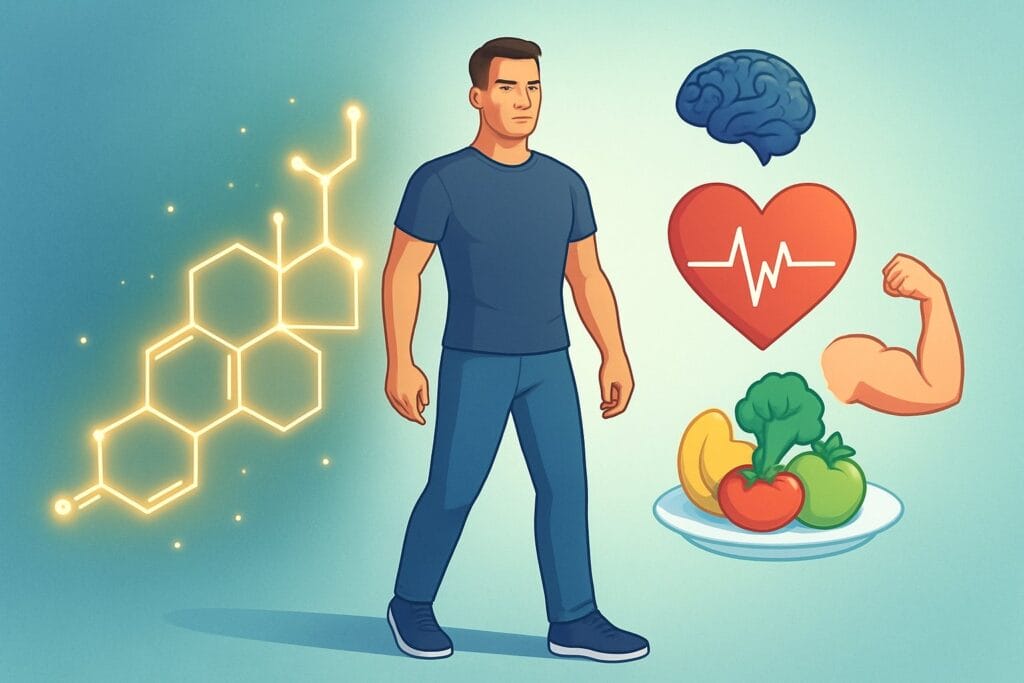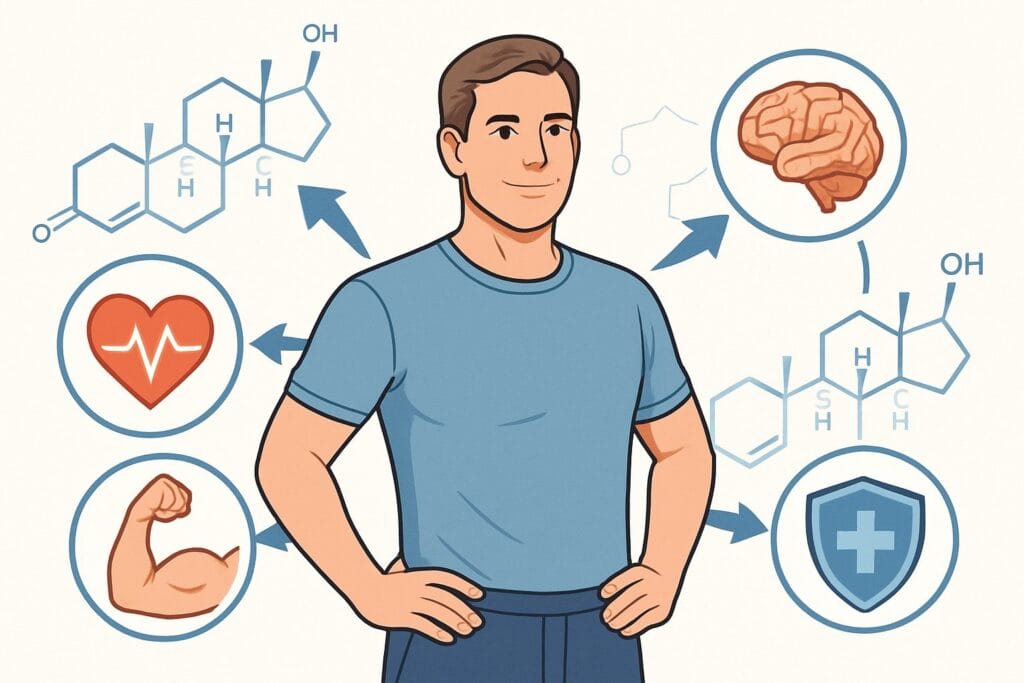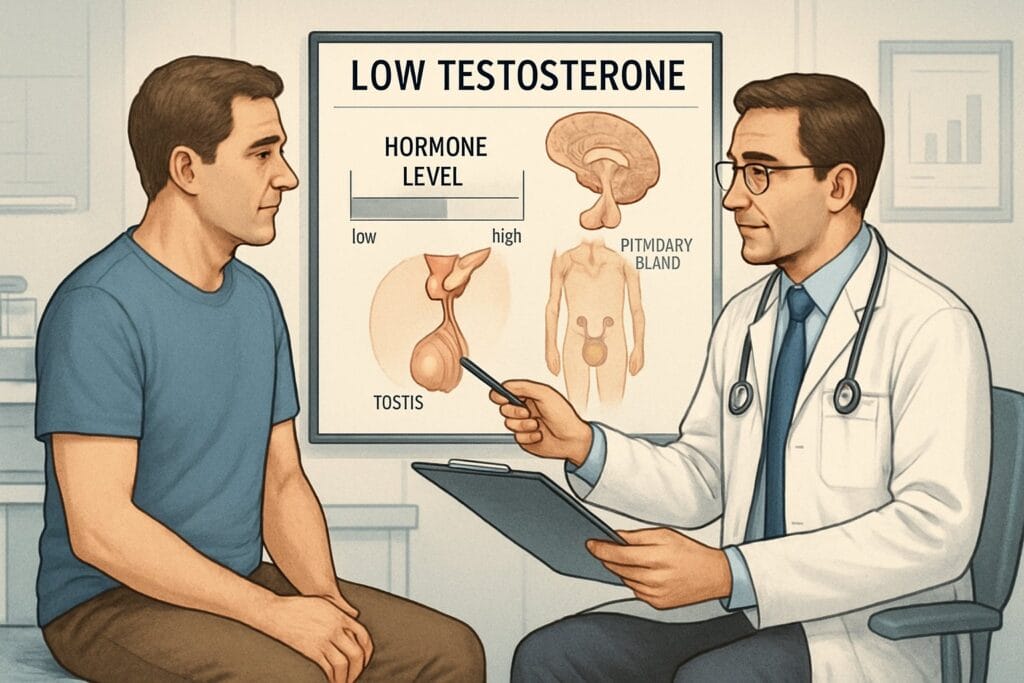Testosterone affects nearly every part of a man’s health, from energy levels and mood to muscle strength and sexual function. This powerful hormone plays a key role in how men feel and perform throughout their lives. As men age, testosterone levels naturally drop, which can lead to various health issues.

Understanding the connection between testosterone and overall health helps men make better decisions about their well-being and treatment options. Many men experience symptoms like fatigue, low mood, and reduced muscle mass without realizing these issues might be linked to low testosterone. The good news is that doctors can easily test testosterone levels and offer effective treatments when needed.
We’ll explore how testosterone impacts different areas of men’s health and what options are available for those dealing with low levels. From lifestyle changes to medical treatments, there are many ways to address testosterone-related health concerns and improve quality of life.
Key Takeaways
- Testosterone influences energy, mood, muscle mass, and sexual health in men throughout their lives
- Low testosterone can be diagnosed through simple blood tests and managed with various treatment approaches
- Combining medical treatment with healthy lifestyle choices often provides the best results for men’s hormone health
Core Connections Between Testosterone and Men’s Health

Testosterone serves as the primary male hormone that controls reproductive function, muscle development, and bone health throughout a man’s life. Men’s testosterone levels naturally decline with age, and various factors can cause low testosterone or hypogonadism.
The Role of Testosterone in Male Physiology
Testosterone acts as the main sex hormone in men. It controls male reproductive development and sexual function from puberty through adulthood.
The hormone plays several key roles in the body:
Physical Development:
- Builds and maintains muscle mass
- Strengthens bone density
- Develops facial and body hair
- Deepens voice during puberty
Sexual Function:
- Controls sperm production
- Maintains sex drive
- Supports erectile function
Research shows testosterone levels link directly to muscle mass in adult males aged 20-59 years. Men with higher testosterone typically have more muscle tissue.
The hormone also affects mood and energy levels. Low testosterone can cause fatigue, depression, and reduced mental focus.
Testosterone influences fat distribution and metabolism. Men with normal levels tend to store less body fat around the midsection.
How Testosterone Levels Change With Age
We see testosterone levels peak in men during their late teens and early twenties. After age 30, levels typically drop by 1-2% each year.
This natural decline creates what some call “male menopause” or “manopause.” The medical term is late-onset hypogonadism.
Age-Related Changes:
- Ages 20-30: Peak testosterone levels
- Ages 30-40: Gradual decline begins
- Ages 40-50: More noticeable drops
- Ages 50+: Significant reductions possible
Older men face increased health risks as testosterone decreases. The risk for prostate cancer rises at the same time testosterone levels fall.
Some men experience more dramatic drops than others. Genetics, lifestyle, and health conditions affect how quickly levels decline.
Causes and Risk Factors for Low Testosterone
Several factors can cause low testosterone beyond normal aging. Medical conditions and lifestyle choices both play important roles.
Medical Causes:
- Klinefelter syndrome
- Testicular injury or infection
- Pituitary gland disorders
- Chronic diseases like diabetes
- Cancer treatments
Lifestyle Risk Factors:
- Obesity and excess body weight
- Lack of regular exercise
- Poor sleep quality
- High stress levels
- Excessive alcohol consumption
Certain medications can lower testosterone levels. These include opioid pain medications and some antidepressants.
Most men with conditions like Klinefelter syndrome go undiagnosed. This means they miss proper medical treatment for low T.
We can address some risk factors through lifestyle changes. Regular exercise, healthy weight, and good sleep habits help maintain testosterone levels.
Diagnosing and Managing Low Testosterone

Low testosterone affects millions of men and requires proper testing to identify symptoms like fatigue, reduced muscle mass, and decreased libido. Effective management combines medical evaluation, treatment options, and lifestyle modifications to restore hormonal balance.
Recognizing Symptoms and Health Impacts
Low testosterone creates a wide range of symptoms that impact daily life. Physical signs include persistent fatigue, reduced energy levels, and decreased muscle mass despite regular exercise.
Men often experience mood changes like irritability, mood swings, and depression. Mental clarity becomes foggy, making concentration difficult at work or home.
Sexual health suffers significantly. Libido drops and sex drive decreases, affecting relationships and self-confidence.
Long-term health consequences develop when testosterone remains low. Bone density weakens, increasing fracture risk as men age.
We see connections between low testosterone and serious conditions. These include cardiovascular disease, diabetes, and metabolic syndrome. Obesity often worsens testosterone deficiency, creating a harmful cycle.
Sleep quality deteriorates, sometimes leading to sleep apnea. This further disrupts hormone production and energy levels.
Evidence-Based Testing and Evaluation
Proper testosterone testing requires specific timing and methods. We recommend blood tests taken in the morning between 7-11 AM when levels peak naturally.
Multiple tests confirm diagnosis since testosterone fluctuates daily. A single low reading doesn’t guarantee deficiency.
Key Tests Include:
- Total testosterone
- Free testosterone
- Luteinizing hormone (LH)
- Follicle-stimulating hormone (FSH)
- Complete blood count
Normal testosterone ranges from 300-1000 ng/dL. Levels below 300 ng/dL typically indicate deficiency requiring treatment.
Doctors also check hematocrit levels before starting therapy. High hematocrit increases blood clot risk during treatment.
Inflammation markers help identify underlying causes. Some men have temporary low testosterone from illness or stress.
Testosterone Deficiency and Related Conditions
Medical professionals call testosterone deficiency “hypogonadism.” This condition has two main types: primary and secondary.
Primary hypogonadism occurs when testicles don’t produce enough testosterone. Secondary hypogonadism happens when the brain doesn’t signal testosterone production properly.
Age-related decline differs from true deficiency. Testosterone naturally drops 1-2% yearly after age 30.
Certain medical conditions worsen testosterone deficiency. Diabetes damages hormone-producing cells over time. Sleep apnea disrupts the sleep cycles needed for testosterone production.
Medications can suppress testosterone levels. These include opioids, steroids, and some antidepressants.
Common Associated Conditions:
- Type 2 diabetes
- Obesity (BMI over 30)
- Sleep disorders
- Chronic kidney disease
- Liver disease
Treatment focuses on addressing both testosterone deficiency and underlying health problems.
Lifestyle Factors and Preventive Strategies
Diet plays a crucial role in testosterone production. We recommend foods rich in zinc, vitamin D, and healthy fats.
Fermented foods support gut health, which influences hormone production. Examples include yogurt, kefir, and sauerkraut.
Beneficial Lifestyle Changes:
- Exercise regularly: Weight training and high-intensity intervals boost testosterone
- Maintain healthy weight: Obesity significantly lowers testosterone levels
- Get quality sleep: Aim for 7-9 hours nightly
- Manage stress: Chronic stress elevates cortisol, suppressing testosterone
- Limit alcohol: Excessive drinking reduces testosterone production
Avoiding processed foods and excess sugar helps maintain stable hormone levels. Trans fats and high amounts of soy may negatively impact testosterone.
Sunlight exposure increases vitamin D, supporting healthy testosterone levels. Aim for 15-20 minutes of direct sunlight daily.
Purchasing Testosterone Injections in United States
Testosterone injections require a valid prescription from a licensed physician. We cannot legally obtain genuine testosterone without proper medical supervision.
Licensed pharmacies provide legitimate testosterone cypionate and enanthate injections. These include chain pharmacies and specialty compounding facilities.
Legal Sources Include:
- CVS, Walgreens, and other major pharmacies
- Hospital-affiliated pharmacies
- Licensed compounding pharmacies
- Certified online pharmacies with prescriptions
Many men search for alternatives like Steroiduck.com and similar online testosterone sources. However, purchasing prescription testosterone without a valid prescription violates federal law.
The FDA warns against unregulated online testosterone sellers. These products may contain dangerous ingredients or incorrect dosages.
Working with a qualified healthcare provider ensures safe, effective treatment. Urology specialists and endocrinologists have extensive experience managing testosterone therapy.
Insurance often covers testosterone replacement when medically necessary. Prior authorization may be required for coverage approval.
Frequently Asked Questions
Men often have questions about testosterone therapy benefits, potential side effects, and natural ways to support hormone levels. Understanding the differences between various treatments and their effects on health helps make informed decisions.
What are the potential benefits of testosterone replacement therapy in men’s health?
Testosterone replacement therapy can help men with diagnosed testosterone deficiency or hypogonadism. We see improvements in chronic fatigue and low energy levels in many patients.
Men often experience better libido and sexual function. The therapy may also help with mood changes and mental clarity.
Some men report better muscle mass and bone health. However, doctors focus more on symptoms than lab numbers when deciding if treatment is right.
What side effects should one be aware of when considering testosterone injections?
Testosterone injections can cause skin reactions at the injection site. Some men experience swelling, redness, or pain where the needle goes in.
Sleep problems like sleep apnea may get worse. We also see changes in mood or increased aggression in some patients.
Blood clots are a serious but rare risk. Men may also have changes in cholesterol levels and blood pressure.
Prostate problems can develop or get worse. Regular monitoring with a doctor is important for all men using testosterone therapy.
What natural methods can support the increase of testosterone production in males?
Certain foods may help support healthy testosterone levels. Fatty fish like salmon provide important nutrients for hormone production.
Dark green vegetables offer vitamins and minerals that support overall health. Cocoa products also contain compounds that may be beneficial.
Regular exercise and strength training can help maintain healthy hormone levels. Getting enough sleep is also important for natural testosterone production.
Managing stress and maintaining a healthy weight support hormone balance. These lifestyle changes work best when combined together.
How does testosterone supplementation differ from testosterone replacement therapy?
Testosterone replacement therapy treats men with diagnosed low testosterone or hypogonadism. Doctors prescribe specific doses based on medical testing and symptoms.
Testosterone supplementation often refers to over-the-counter products. These supplements claim to boost testosterone but are not regulated like prescription medicines.
Replacement therapy uses synthetic testosterone that matches what the body makes naturally. Supplements usually contain herbs, vitamins, or other compounds that may support natural production.
Medical supervision is required for replacement therapy. Supplements can be bought without a prescription but may not be as effective.
Can high levels of testosterone have a positive impact on overall men’s health?
Higher testosterone levels within normal ranges may help with energy and muscle mass. Men often feel more motivated and have better physical performance.
However, very high testosterone levels can cause problems. We see increased risk of heart issues and aggressive behavior in some cases.
The goal is healthy levels, not the highest possible levels. What works for one man may not work for another.
Doctors look at symptoms and overall health, not just testosterone numbers. Balance is more important than having extremely high levels.
How do testosterone boosters work and what should men consider before using them?
Testosterone boosters usually contain herbs, vitamins, and minerals. Many products now include ingredients like ashwagandha root extract that may support natural hormone production.
These products claim to help the body make more testosterone naturally. They do not contain actual testosterone like prescription treatments do.
Men should talk to their doctor before using any testosterone booster. Some ingredients can interact with medicines or health conditions.
Results vary widely between different products and people. We recommend choosing products from companies that test their ingredients for quality and purity.
The Editorial Team at Healthcare Business Today is made up of experienced healthcare writers and editors, led by managing editor Daniel Casciato, who has over 25 years of experience in healthcare journalism. Since 1998, our team has delivered trusted, high-quality health and wellness content across numerous platforms.
Disclaimer: The content on this site is for general informational purposes only and is not intended as medical, legal, or financial advice. No content published here should be construed as a substitute for professional advice, diagnosis, or treatment. Always consult with a qualified healthcare or legal professional regarding your specific needs.
See our full disclaimer for more details.







